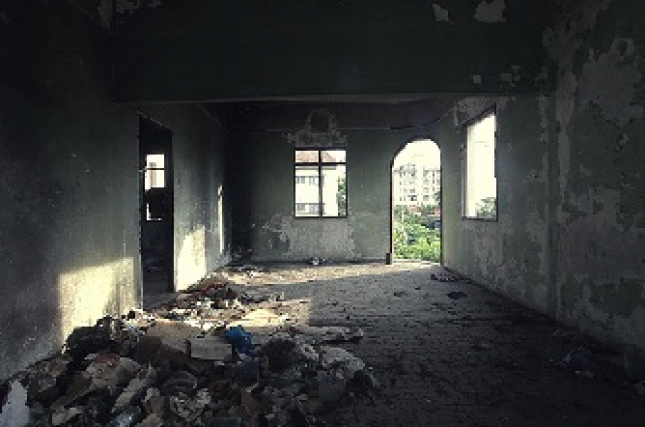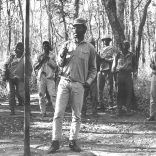Mozambican film premieres in theatres across Portugal
A Memory in Three Acts: Mozambican film selected for Zanzibar International Film Festival

In three acts (plus a poetic prologue and epilogue), some of those who lived through it tell their story about the struggle for independence. A former political prisoner returns to the building named Vila Algarve, where he was tortured... (Still image)
After being awarded an Honourable Mention at the International Ethnographic Film Festival in Recife, Brazil, the documentary ‘A Memory in Three Acts’ [‘Uma Memória em Três Actos’], directed by Inadelso Cossa has now been selected for the Zanzibar International Film Festival in Tanzania.
The festival will take place in various locations in Zanzibar’s Stone Town from 7 to 15 July 2018.
A Memory in Three Acts has been selected for the documentary category of the official competition, which attracted entries from more than 140 countries around the world, the US and India leading.
Filmmakers from East Africa have also been showing great interest, with Ugandan filmmakers sending 55 films along with 54 from Kenya and 31 from Tanzania. Selected movies cross a broad spectrum of topics and genres represent more than 40 countries, with strong African representation.
The films in competition are from countries like Tanzania, Kenya, Uganda, Rwanda, South Africa, Nigeria, Sierra Leone, Iraq, Western Sahara, Niger, Iran, United States, France, Ghana, Belgium, Tunisia, Swaziland, India and the United Kingdom, among others.
Talking about the selection process, festival director Fabrizio Colombo said the following.
“The sheer number of film submissions for ZIFF 2018 came as a surprise. It is gratifying to see how much the festival is growing and attracting so many filmmakers from around the world, but especially from our continent. We have tried to stay close to our theme for this year, celebrating the courage of many filmmakers who are telling the truth and speaking for a positive change in this world. Obviously, some selected movies will shake old systems of energy and mentalities and that’s what cinema is about: defying perceptions and imagining a different world. Finally, I am happy to see the potential of the East African film industry being realised, and I must particularly mention the creativity of young Tanzanian filmmakers who, through their short films, are really showing that there is a new wave of cinema in Tanzania. We invite all moviegoers to join us this year in Zanzibar! ”
A Memory in Three Acts by director Inadelso Cossa is a postcolonial poetic essay that explores the dramatic narratives of collective memory and post-colonial trauma where anonymous characters in history go on a quest for therapy to exorcise themselves from the colonial ghost and find a possible reconciliation with the past today.
Shot in an experimental hybrid fiction/documentary style, the film proposes a contemporary portrait of the history of Mozambique in three Acts.
Inadelso Cossa is a Mozambican director and producer, author of Xilunguine, The Promised Land, winner of the Estação Imagem Mora award for best documentary at the Evora International Short Film Festival in 2013 and the jury prize at the Ethnographic Film Festival in Recife. He has participated in festivals such as the Berlinale, Locarno and Venice. A Memoir in Three Acts is his first full-length documentary and the last of his trilogy on “The Memory Exercise”, which started in 2010 with the film Xilunguine – The Promised Land.
The movie earned an Honourable Mention at the Recife Ethnographic Film Festival in Brazil and has been shown at festivals such as the Independent Film Festival of Lisbon in 2017 and IDFA-International Documentary Festival of Amsterdam in the Netherlands, where it had its world premiere and also earned an Honourable Mention.
This is how the movie is presented by the International Documentary Filmfestival Amsterdam:
Mozambique gained independence from Portugal in 1975, following a bloody struggle that lasted more than a decade. In three acts (plus a poetic prologue and epilogue), some of those who lived through it tell their story about the struggle for independence. A former political prisoner returns to the building named Vila Algarve, where he was tortured – though dilapidated now, it is still maintained as a monument to what took place. There were many who did not survive the torture. We also get to hear the other side of the story, as told by the daughter of an agent of the secret police who was murdered before her eyes following the fall of the Portuguese dictatorship. This striking mix of archive footage, shots of present day and the pervasive soundtrack give us the feeling that past and present are inextricably linked. The oral testimonies bear witness to a multifaceted colonial trauma, and the wounds are still fresh.












Leave a Reply
Be the First to Comment!
You must be logged in to post a comment.
You must be logged in to post a comment.